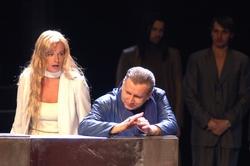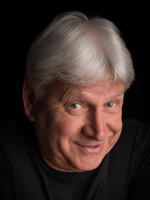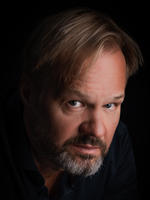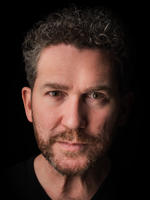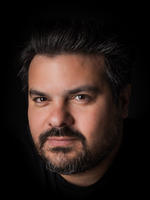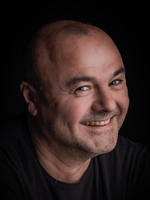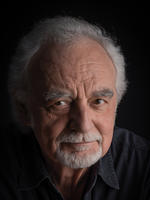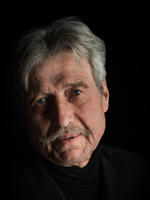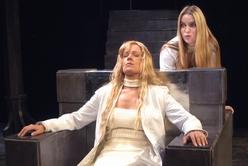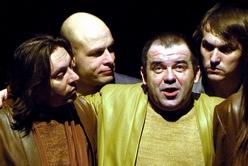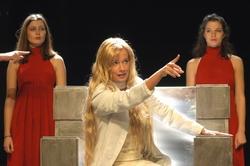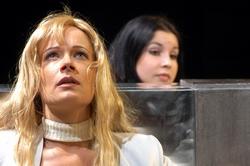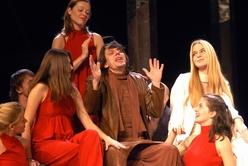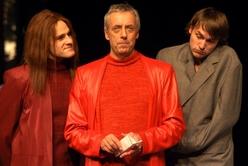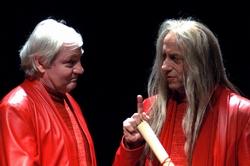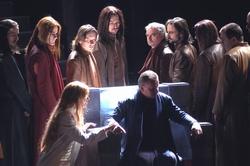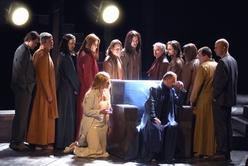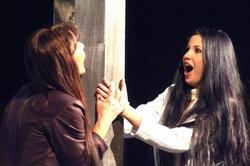Not Only Popcorns Turned Historical Parables Present
Tomáš Hejzlar 15. March 2004 zdroj Haló noviny
Shakespeare’s Timeless Message about English King and His Court
The Brno Municipal Theatre presented a Czech premiere of the play Henry VIII on 21 February 2004. The historical parable by William Shakespeare was directed by Stanislav Moša. The Famous Story of the Life of Henry VIII (the full title of the play) is an epilogue of Shakespeare’s work.
The play has never been performed until now, although the first Czech translation written by Josef Čejka was ready as early as in 1870.
The second successful language transcription by Antonín Klášterský was born in 1915 in relation to the contemplated inclusion of the title in the repertory of the Prague National Theatre. However, the idea of Jaroslav Kvapil to put the work on the stage was not realized because of the fear the drama would be prohibited by Austrian censorship due to its anticlericalism. The third translation made by František Nevrla in 1962 was not put on any stage in that politically loose period either. Only the latest translation by Jiří Josek has found its presentation on the stage.
Shakespeare’s General Validity
“The play tries to self-ironize the man in various situations and I suppose the smile of audience will cause they will meditate over the principal questions of our lives more intensively,” the director Moša said. In his opinion, the play tempts the producers to create a huge spectacle with hundreds of actors and parades. “Surely, animals could walk on the stage as well. However, we have cast the performance in a chamber way as it was usual at Shakespeare’s times, but at three levels,” Moša added. “Some figures are historical, other present or timeless,” the director described his concept.
How Moša Can See It
Relativization of the firm structure of action makes the performance not only highly politically timeless, but it also creates a stage fairy-tale approaching the technique of experimental creative process that was typical for the Czech production of 1960’s. Thus, it resembles realization visions of Otomar Krejča or Alfréd Radok, or nowadays, of Vladimír Morávek or Jan Antonín Pitínský. Moša continues the most valuable traditions of the Czech directorial school, but in comparison to the traditional stage stylization he inclines to the technique of radio “audiovisualisation”: he gives up empty gestures to make the tendency to the prescribed word more intensive with the chamber character. But he is not just a mere describer of the line of action: he makes the play psychological, or more exactly, imaginary as it is typical with the techniques of Emil František Burian.
Moša’s Shakespearean action with all its percussiveness of content resembles in its stage appearance rather a cinematic visualisation typical for the directors Krška, Vláčil and others: he is not taken by storm of the dynamics of content (which is completely preserved), but he enriches it with anticipated values of imagination felt impressionistically. Thus, the trinity of directorial conception interpreted by Moša himself does not just mean an effort to be different, it is an independent way offering emotionality to the Shakespearean action, i.e. the emphasis on the actual theatrical aesthetics, besides the updating pregnancy.
Colourful Spectacle with Political Context
Moša’s performance is accompanied with a “proscenium” couple of cheeky fellows of the present time (Viktor Skála and Petr Štěpán) who comment actions, performing thus the roles of traditional narrators. They always turn up when the action needs to be shifted forward, commented, enriched aesthetically. They may resemble Voskovec and Werich with their famous “proverbs”, but Moša does not accept the classics of the Czech comic in their postures. His couple is original and belongs just to this play. Shakespeare’s colourful spectacle where the political game is mixed with the tragic without bitterness, kind comic and a certain kind of ritualism is presented as a series of episodes depicting rises and falls of eminent people – the Duke of Buckingham (Petr Gazdík or Igor Ondříček), Henry’s first wife Catherine of Aragon and Cardinal Wolsey, omnipotent king’s advisor. However, these people do not die realistically, they are led in euphemistic reconciliation to further “wondering through the history” in civil symbolism and with ritual gentility. Perhaps, no existing Shakespearean film or performance put on stage so far has parted with the dying so sensitively. Moreover, individual characters are not limited with mere textual patterns.
For example, the title role of King Henry VIII is played by Jan Mazák emphasizing his civilian immediateness. Nor the roguish medieval English “Richelieu”, i.e. Cardinal Wolsey presented sophisticatedly by Ladislav Kolář, is not just constructed as a plotter – and further merits of other characters, such as Lord William Sands played suggestively by Jan Apolenář, could be enumerated. All the characters delivered valuable performances. But Queen Catherine cannot be missed out: Alena Antalová shined as a first magnitude star indeed. They all delivered performances adequate to the unique character of the performance itself on almost ascetic stage with gothic signs designed by Jaroslav Milfajt, in costumes by Andrea Kučerová, on sensitive musical background by Zdenek Merta. The play ends forgivingly – in the presence of a real baby in a wrap, the future queen. “This is the most essential message of the play: although a man dies and is mortal, he is immortal in his children”, the director Moša remarked.
Henry VIII
David Kroča 1. December -1 zdroj ČRo, Vltava Radio Station
The Brno Municipal Theatre presented this weekend William Shakespeare’s play King Henry VIII that has not been put on any Czech stage so far. Stanislav Moša, director of the theatre producing the presentation discovered the play for himself when the well-known Anglicist and translator Jiří Josek devoted him his new translation of the play. This is a review by our Brno collaborator David Kroča dealing with the Czech premiere of the Shakespeare’s drama that had been thrashed for a long time.
Not only one but several cloudlets of secret are floating around the play presented in the Brno Municipal Theatre under the title King Henry VIII. Some experts claim the play was not written by Shakespeare, others say it is his best dramatic text. The dramatic advisors Jiří Záviš and Ladislav Stýblo went the golden middle path admitting the play was written by two authors. Besides Shakespeare they mention the English dramatist John Fletcher as a co-author who is supposed to have written some less significant situations. Another interesting question is why the play has not been performed in the Czech Republic yet. The dramatic advisors explain this fact in the programme stating the play was thought too anticlerical at the beginning of the past century when Antonín Klášterský wrote his translation.
From the present point of view, the play is surprising due to its present-day character of the principal themes and embellishment with various metaphors and old rituals. There is also a lack of rich action usual in the plays of the Elizabethan dramatist. Its simple composition is made by a chain of intrigues, rises and falls at the court of the English king Henry VIII. The first victim of court intrigues was the Duke of Buckingham executed with the contribution of Cardinal Wolsey; then the grim fate of Queen Catherine concluded with a divorce and dishonourable death follows, and finally, it is the Cardinal’s turn when his neck is broken with his own plots. The director Stanislav Moša presents these falls of the mighty persons using repeated rituals. After the ceremonial washing of feet and their last monologues the heroes disappear from the stage, figuratively and literally: with the help of two narrators the characters are coming symbolically down among the spectators.
In spite of the preceding tragic fates, the grand finale ends up optimistically. The king and his courtiers welcome the newborn princess Elizabeth bringing a new hope for the whole England which will come to fruition as it is known from the history. The director had a real newborn brought on the stage increasing thus the emotional effect of the end, which, on the other hand, could work as emotional extortion. However, the cornerstone of Moša’s directoral conception is not the newborn on the stage but his sophisticated playing with symbols, archetypes and alienation effect. On the stage designed by Jaroslav Milfajt there are just plated columns and two connected thrones in which the misshapen silhouettes of performers reflect like in mirrors. Traditional symbolism of colours, especially red, black and white, is used in costumes designed by Andrea Kučerová. Each character wears a long leather coat and a pullover in the same colour underneath giving the look of almost permanent nobility.
The best premiere performance was delivered by Ladislav Kolář acting Cardinal Wolsey. First, he offered an excellent study of an intriguer telling lies to people with a kind smile, then, an impressive image of a broken man tormented with his own ambitions. It would be a shame not to mention Viktor Skála and Petr Štěpán (First Man and Second Man) in the appreciative roles of inciters and comics attributed to them by the director. Thanks to these characters, the almost three-hour presentation has a brisk pace and tension.
The Czech premiere of King Henry VIII proved the Shakespeare’s text had been neglected unjustly on Czech stages for many years. It is a remarkable play in which the topical social and political themes mingle with individual human fates directed to the timeless message of the limits of human dignity. The Brno Municipal Theatre has completed its repertory with the title offering various surprises to the audiences.
Everything is really true
Jaroslav Parma 1. December -1 zdroj Information Monthly of the City of Blansko
Although as early as in 1870 the first Czech translation (by Josef Čejka) was published of the play Henry VIII by William Shakespeare and John Fletcher, the play had never been presented in any Czech theatre. In fact, such statement was valid until 21st February of this year, when the first night of the play was presented in the Městské divadlo Brno under the direction of Stanislav Moša, for whom this dramatic play was an important goal to achieve. Henry VIII is probably one of the last plays of the famous playwright; the second author, 15 years younger John Fletcher, probably just adapted the play, which is what the specialists allege. The title itself could mislead us to think that the play is just biographical view of the famous king, however the subtitle “Everything is True” indicates something else. The content of the play is really based on the episodes of the relations of Henry VIII and his two wives Catherine and Ann Boleyn, however such episodes are only an excuse for the development of deeper insights in people’s souls. Although 390 years have passed since the first staging of the play, this is an unbelievably contemporary play and live, ruthlessly uncovering people’s characters. The new translation by Jiří Josek (St. Moša: “I read it in one breath and I was sure it must be put to stage”) surely adds on the top of this; it was adapted by the director and dramatic advisor Jiří Záviš. As it is first of all a play about people, the actors are untraditionally listed first in the programme, and I will keep this approach: Jan Mazák playing the leading part is normal, without much pretending King Henry’s feelings and his ambition to govern; Alena Antalová exactly interprets the feelings of famous and condemned Catherine; Veronika Poláčková (a JAMU student, she alternates with her classmate Eva Ventrubová) with sensitivity leads Ann Boleyn through her destiny; Igor Ondříček (he alternates with Petr Gazdík) is capable of distinguishing between the feelings of the Duke of Buckingham or Archbishop Cranmer; Ladislav Kolář gave to Cardinal Wolsey perfect cruelty and smoothness; Erik Pardus goes through deep development together with his Duke of Norfolk. It was a co-incidence for Viktor Skála and Petr Štěpán to meet again as a co-operating pair of narrators and their performance is perfect. The same can be said of other actors who appear interpreting several characters, such as Karel Janský, Stano Slovák (who is also the assistant director), Ján Jackuliak, Jan Apolenář, Tomáš Sagher, Pavla Ptáčková, Miroslava Kolářová, and many more. (The above-mentioned casting is from the first night presented 21. 2.). Jaroslav Milfajt as a guest is the author of the impressing scene. Costumes, creating the atmosphere of the play, were designed by Andrea Kučerová. Choreography co-operation - Vladimír Kloubek as a guest; music - Zdeněk Merta. If I am not mistaken, Henry VIII will occupy the throne of the spectators´ interest for a long period of time. It is really good that meeting Henry was “a love at the first reading” for Stanislav Moša.
What is All True about Henry VIII?
Vladimír Čech 1. December -1 zdroj Kam
The Brno Municipal Theatre was contemplating Shakespeare’s drama King Henry VIII sooner but on many requests of its home fans Musicals from Broadway were included in the repertory instead which were originally meant exclusively for export. And so the play about the unstable king was presented as late as at the end of February (premieres on February 21 and 22, 2004). This play is shrouded with many question marks and this performance does not trivializes them, rather on the contrary.
The question whether it is Shakespeare’s last or one but last play is relatively the most insignificant. Nevertheless, Shakespeareologists argue about who is the author of the play and their opinions oscillate between the two extremes: “Shakespeare himself is an exclusive author” versus “Shakespeare did not write a single letter”. The latter negative opinion is related to the negative evaluation of the play showing a number of weak points which are not worthy of the reputation of one of the Elizabethan dramatists. Finally, it is not known under which title the play was performed originally. Many researchers think that the play was presented under the title All Is True at the Globe Theatre. This is cited in a song about a fire in the theatre. It is mentioned there that a play about Henry VIII was on and each strophe is concluded with an ironic paraphrase to the title All Is True. Let’s explain to the readers that the Globe Theatre caught fire during the performance on June 29, 1613 when a gun shot announced the arrival of the king and his company.
How did the producers answer the above questions? In both the ways. Besides Shakespeare, his co-worker John Fletcher (1579-1625) is also mentioned as the author, it is said they wrote at least three plays, including All is True, in common. As for the title, KING HENRY VIII (All is True) is another compromise. Only as for the quality of the text and the whole presentation, every spectator must answer by himself. According to the first responses, opinions are different.
Many people may object that the presentation lacks action, murders, maybe by dagger, do not take place in front of the eyes of audiences. But if you watch the play carefully, you can see killing takes place there too, but rather by words than by direct physical force. Calumny, imputation, conspiracy prevail. The text is up-to-date in this respect, just change names, facts and you will find yourselves in the present time. Well, people were, are and probably will be the same in their nature.
The Brno Municipal Theatre presents the play King Henry VIII in a Czech premiere, though Jiří Josek’s translation, which was used as its basis (adapted dramaturgically by Stanislav Moša and Jiří Záviš), is the fourth published Czech translation. Is is surely by coincidence to a certain extent that the play has not appeared earlier, its anticlericalism and the fear of clerical censorship must have played their roles.
I am convinced that the performance is a success, the director Stanislav Moša managed to profit properly in an artistic way from his brave entry on an unknown land. The story of relatively young Henry VIII and his first wife Catherine of Aragon interlaced with a steep entrance of Ann Boleyn in the second part has its tragic as well as expressly funny positions as the life itself has. The end is not pessimistic but the play is concluded rather with a vision, a prophecy of blooming England under the rule of Elizabeth I, child of the king and Ann Boleyn. Jaroslav Milfajt (guest) managed to impress the hallmark of monumentality into the presentation without devising complicated colossi. The quite simple thin portico and the proscenium extended across the orchestra pit give an impression of surprising depth of the stage. The hallmark of nobility can be seen on the costumes designed by Andrea Kučerová where red and brown shades prevail. An important role is also played by lighting and by Zdenek Merta’s unobtrusive background music. When you read the used text included traditionally in a thick programme brochure and remember what happened on the stage in the respective moment, you can say that Muse had to kiss Stanislav Moša (and Vladimír Kloubek - guest, signed under the movement cooperation) very much when they managed to move even philosophical sentences. The performance is very alive, theatrical in the right sense of the word, with deep thoughts, which requires comedy on the other hand. It is neither boring though it lasts two hours and three quarters with a single interval, nor it has a scent of book. It culminates in three same rituals when the Duke of Buckingham, the Cardinal Wolsey and the Queen Catherine depart their lives one after another. The above protagonists die with a ceremonial majesty putting their wigs and parts of dresses aside to be dropped down under the stage, out of the angle of vision of audiences. However, the suggestive end of these scenes is derogated with the fact – and this is one of the minimum rebukes against the director’s interpretation – that the dead persons run to the backstage through a corridor in front of the eyes of spectators instead of being hidden behind a trap door.
If you think of the play, it cannot be labelled as entirely tragicomical. It has not a real happy ending if the vision of flowering England under the rule of Elizabeth I is not regarded as such. The peripeteias of the story result in just denouements, the evil is punished exemplarily in fact and its greatest representative Cardinal Wolsey is defeated finally and accepts his fate with remorseful humbleness. The Bishop of Winchester, “his successor”, cannot plot his intrigues finally. So what more can supporters of truth and right wish? Just let the present monkey businesses finish similarly.
It would not be Shakespeare without giving perfect opportunities to actors. The villainous Cardinal Wolsey is surely one of the life roles for Ladislav Kolář. He is an incarnate danger under the veil of sliminess and religiosity. Alena Antalová is surely noble as Queen Catherine, though the historical one was probably not so charming. A greenhorn in title roles is Jan Mazák, though he is a member of the ensemble since last April. If I am not wrong, he comes from Kroměříž, acted in Ostrava, then in Hradec Králové, and then returned to Moravia. At first sight, his Henry VIII looks civilian and contemporary. While the majority of actors wear wigs, he does not. Crew cut of slightly greyish hair, no beard – this is also why Mazák defies by sight from the performance. Audiences must get used a bit to this Henry VIII, surely it is not the rooted Werichian or Burtonian type. But this does not mean that Mazák would be unconvincing.
In the conclusion, Elizabeth I appears as a baby on the stage. The baby girl in a binder is Mazák’s daughter. During the repeat on Friday, March 5 she was silent, just moved her arms when a reflector illuminated her. You could argue if it is a baby or a doll with some ingenious mechanism. But the baby’s crying was heard at the premiere. As it can be seen, the baby is getting used to the theatre very quickly...
Let’s mention at least the couple of reviewers Viktor Skála - Petr Štěpán as the First Man and the Second Man who take care of the comic together with the permanent humourist Erik Pardus who found a great number of opportunities to apply his contagious comic in the part of the Duke of Norfolk. They wear worn dresses on their naked bodies and have no wigs, making a satiric choir. As if the present day spoke through their mouths.
The theatre in Lidická Street was sold out on the first Friday in March. Final ovations of this re-run were deservedly so great that other companies have not such at premieres.

